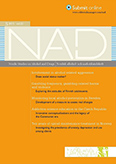 Results have been published from my study on gambling-related embezzlement and other harms from gambling in the workplace. This paper focuses on prevention and responses to gambling harm.
Results have been published from my study on gambling-related embezzlement and other harms from gambling in the workplace. This paper focuses on prevention and responses to gambling harm.
Abstract
AIMS – Problem gambling, even if it occurs in leisure time, can cause harm in the workplace. Problem gamblers are preoccupied with gambling and often suffer from psychiatric and psychosomatic symptoms caused by their excessive gambling. This may lead to inefficiency at work and absenteeism. Severe gambling problems typically lead to a constant need for money, which may result in theft of money or goods from the workplace and in embezzlement. This paper outlines measures to prevent and respond to gambling-related harm and crime in the workplace. METHODS – A review of the literature and qualitative interviews with therapists specializing in problem gambling treatment, peer counsellors from mutual support societies, recovered problem gamblers who have embezzled, and professionals working in workplace crime security and the prevention of alcohol, drug and gambling harm. RESULTS – Important measures in preventing and responding to gambling harm in the workplace include: substance use and gambling policy, problem gambling awareness, attention to signs of gambling-related harm, control functions, appropriate responses to harmful gambling, and rehabilitation. CONCLUSION – The workplace should play a greater role in the universal, selective and indicated prevention of problem gambling.
– Binde, P. (2016). Preventing and responding to gambling-related harm and crime in the workplace. Nordic Studies on Alcohol and Drugs, 33(3), 247–266. Open access – free download.
– A popular science web article (in Swedish) about the study is published on the popNAD website – read it here.

